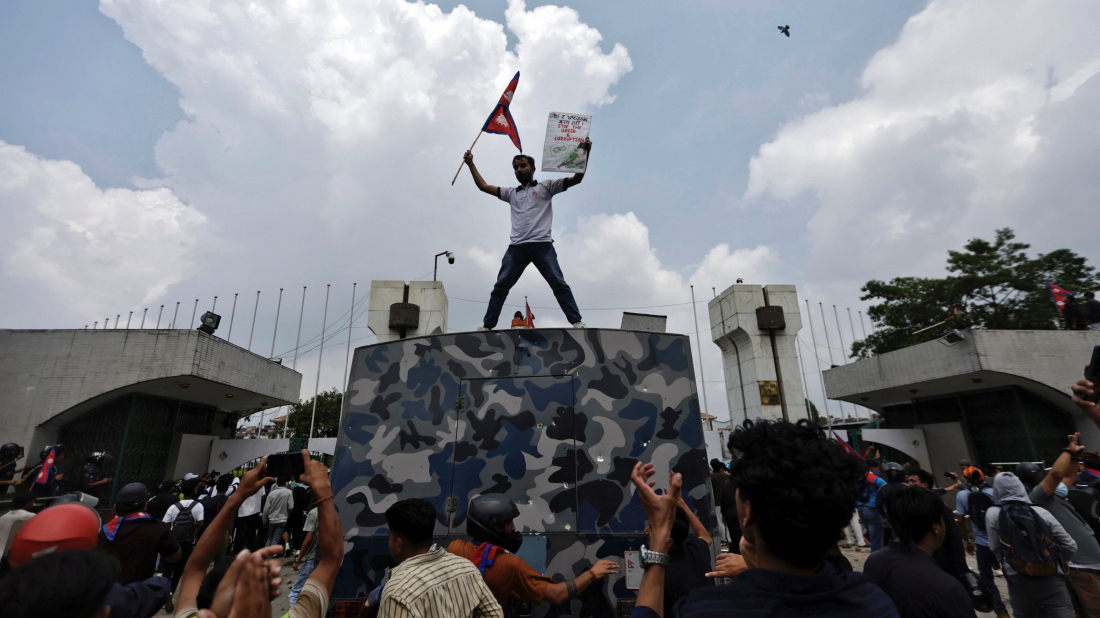Sánchez accuses Israel of genocide, triggers fierce diplomatic clash
Diplomatic tensions between Spain and Israel have escalated sharply, with Madrid recalling its ambassador from Tel Aviv on Monday. The move came after...

At least 19 people were reported dead and dozens more injured in Nepal’s capital on Monday according to the state media after police fired tear gas and rubber bullets at demonstrators attempting to storm parliament over a social media blackout and corruption.
According to a local official, some protesters forced their way into the parliament compound by breaking through barricades, setting fire to an ambulance, throwing objects at riot police, and ferrying the wounded to hospitals on motorbikes.
“The police have been firing indiscriminately,” one protester told ANI news agency. “They fired bullets which missed me but struck a friend standing behind me, injuring his hand.”
Nepal Television reported more than 100 injuries, though there has been no official confirmation, and Reuters was unable to independently verify the figures. Parliamentary spokesperson Ekram Giri confirmed that some protesters entered the premises but not the main building and were eventually dispersed by police.
Organisers described the demonstrations, which spread to other cities, as a “Gen Z movement”, saying they reflected young people’s frustration with the government and discontent with its policies. “This is the protest of Nepal’s new generation,” another demonstrator told ANI.
The unrest was fuelled by a government decision last week to block access to several social media platforms, including Facebook, citing their failure to register with authorities amidst a crackdown on misuse. Officials argued that fake accounts were being used to spread hate speech, misinformation, fraud, and other online crimes. About 90% of Nepal’s 30 million citizens are internet users.
Police were authorised to use water cannons, batons, and rubber bullets, while the army was deployed in protest areas to reinforce law enforcement, district office spokesperson Muktiram Rijal told Reuters. He said the curfew, extended until 10 p.m. local time (16:15 GMT), covered the Singha Durbar area, home to the prime minister’s office and other government institutions.
Similar demonstrations were reported in Biratnagar, Bharatpur, and Pokhara. Thousands of young people, many in school or university uniforms, marched through Kathmandu carrying the national flag and placards reading “Shut down corruption and not social media”, “Unban social media”, and “Youths against corruption”.
Critics argue corruption is endemic in Nepal, and Prime Minister K.P. Sharma Oli’s government has been accused by opponents of failing to deliver on its pledges.
Nepal’s move to restrict social media access comes as governments worldwide, including those in the United States, European Union, Brazil, India, China, and Australia, tighten regulation of social media and Big Tech amid rising concerns over misinformation, data privacy, online harm, and national security. While critics warn such measures may suppress free expression, regulators insist stronger oversight is necessary to safeguard users and maintain public order.
AnewZ has learned that India has once again blocked Azerbaijan’s application for full membership in the Shanghai Cooperation Organisation, while Pakistan’s recent decision to consider diplomatic relations with Armenia has been coordinated with Baku as part of Azerbaijan’s peace agenda.
A powerful eruption at Japan’s Shinmoedake volcano sent an ash plume more than 3,000 metres high on Sunday morning, prompting safety warnings from authorities.
A day of mourning has been declared in Portugal to pay respect to victims who lost their lives in the Lisbon Funicular crash which happened on Wednesday evening.
The UK is gearing up for Exercise Pegasus 2025, its largest pandemic readiness test since COVID-19. Running from September to November, this full-scale simulation will challenge the country's response to a fast-moving respiratory outbreak.
A Polish Air Force pilot was killed on Thursday when an F-16 fighter jet crashed during a training flight ahead of the 2025 Radom International Air Show.
Diplomatic tensions between Spain and Israel have escalated sharply, with Madrid recalling its ambassador from Tel Aviv on Monday. The move came after the Israeli government accused Spain of antisemitism and barred two Spanish ministers from entering the country.
France’s National Assembly has toppled the government over its debt-cutting agenda, forcing President Emmanuel Macron to seek a new prime minister amid rising calls for snap elections and mass public unrest.
Prime Minister François Bayrou will submit his resignation to President Emmanuel Macron on Tuesday morning following a failed confidence vote in the National Assembly.
The European Union’s chief sanctions envoy visited Washington on Monday with a team of experts to discuss what could become the first joint transatlantic measures against Russia since President Donald Trump returned to office.
Afghanistan and Turkmenistan have agreed to strengthen cooperation on major energy projects, including electricity transmission and the long-delayed TAPI gas pipeline, during high-level talks in Kabul.
You can download the AnewZ application from Play Store and the App Store.

What is your opinion on this topic?
Leave the first comment